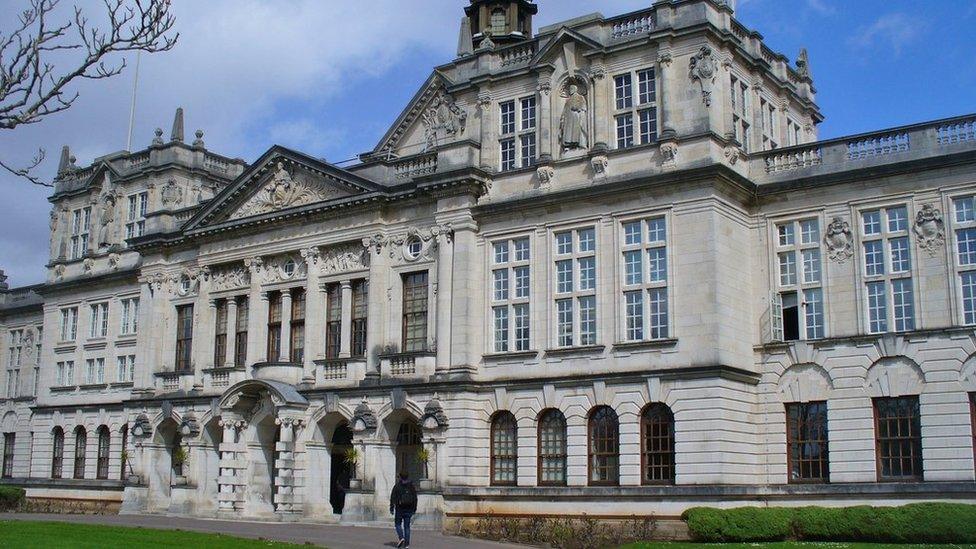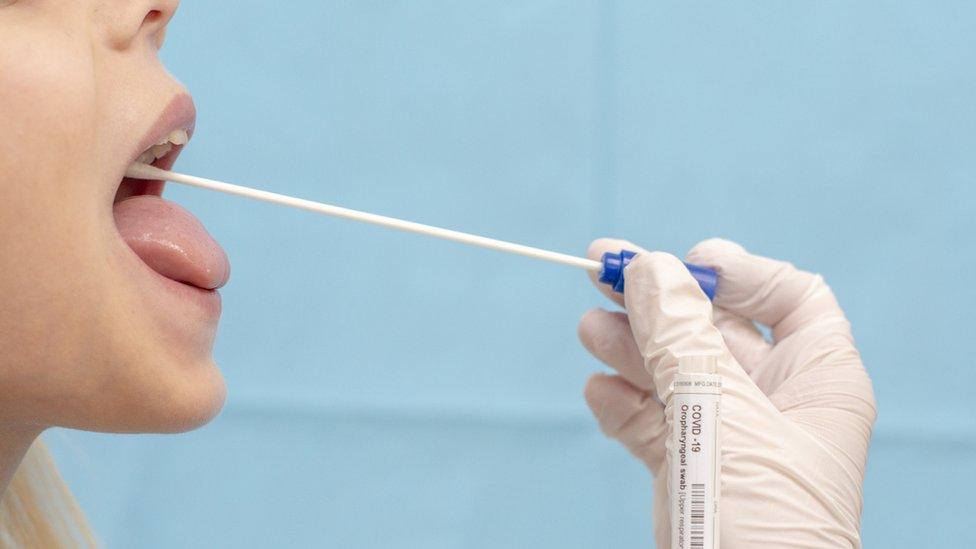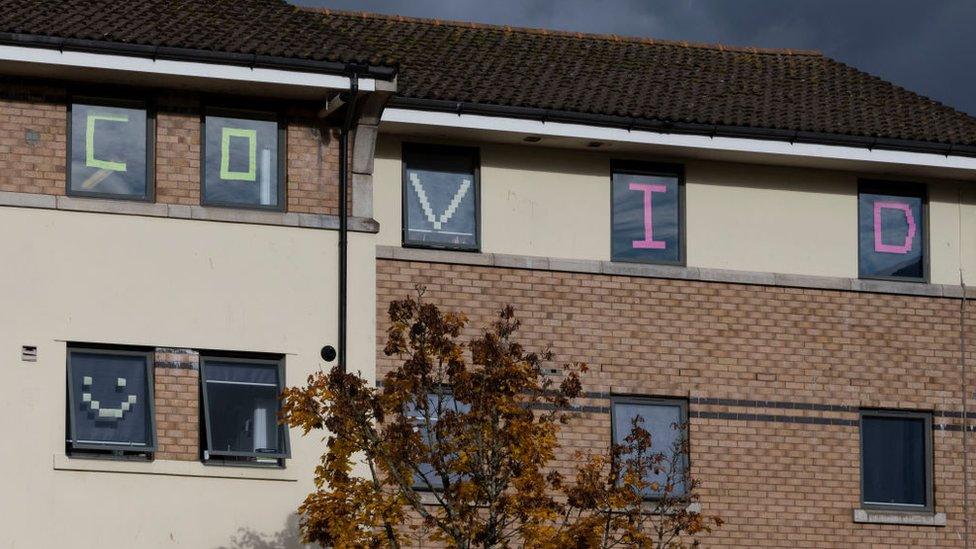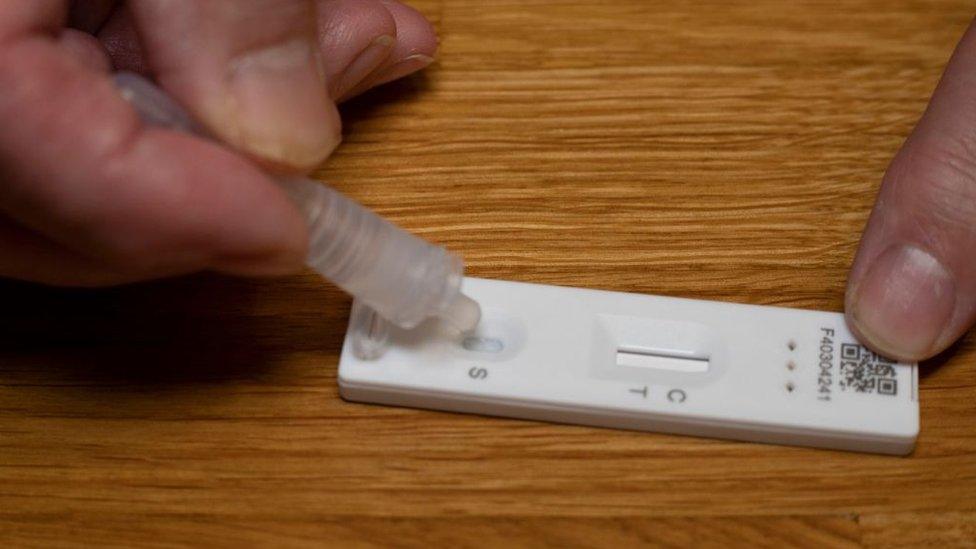Covid: Cardiff University testing system 'fatally flawed', ex-boss claims
- Published
The university said it "completely rejects" Mr Evans' claims
The manager of Cardiff University's Covid testing system quit because he thought it was "fatally flawed".
Neil Evans said he thought results were not reliable before the system's launch and the university wanted to start it too quickly ahead of the autumn term.
He left his role on 23 September and the system was rolled out in October.
The university said it "completely rejects" Mr Evans's claims and that the system led to "hundreds" of asymptomatic cases being identified.
Allan Wilson, the president of the Institute of Biomedical Science, said he had some concerns with the system.
What is the testing system?
Cardiff University said it had carried out about 25,000 tests since the system was launched and that the programme helped to identify "a few hundred" asymptomatic positive cases.
It said these people then self-isolated rather than "unknowingly spreading infection".
The system involved students and staff giving a saliva sample, which then underwent a PCR test.
People who tested positive were then told to get a confirmatory NHS swab test.
The university "estimates concordance with the NHS test at around 90%".

Cardiff University said it "completely rejects" Mr Evans's claims
'Fatally flawed'
Mr Evans worked as a service manager at the facility in August and September while the system was being developed, before resigning on 23 September, two weeks before the programme was launched.
He said he was happy to get the job as he felt the service could help staff and students return safely to campus in the autumn.
But he said he became concerned at what he saw as the university's desire to introduce the service "at pace" when he felt more time was needed to validate the system by testing its results against known samples from an NHS laboratory.
He said: "It was fatally flawed for various reasons.
"You couldn't trust the test results, fundamentally there's no trust in any of the test results," he added.
"So all of those students will be giving saliva under false pretences that you get a result back either positive or negative.
"But for me at that point, I couldn't have signed off on those results, because I wouldn't have been happy with the validation of the process.
"The whole process needed a few more months and a bit more validation, a bit more accreditation, a bit more forethought and then, yes, it would have been a really good service."

The university said the testing system it used had uncovered "a few hundred asymptomatic positive cases"
Mr Evans said Public Health Wales (PHW) shared his concerns about the risk of false results.
"PHW didn't want it to happen at all and they saw it as more of a hindrance than a help," he said.
What has the university said?
A Cardiff University spokesman said: "We completely reject the claim that our screening service was not ready to go live.
"We have been clear throughout that our screening service is not (currently) accredited by the regulatory authorities.
"However, our screening service has been recognised by relevant authorities and we have responded to requests such as those to test students on NHS placements ahead of the Christmas break.
"During the early stages of the project, we took advice from the Department of Health and Social Care (DHSC) on all control and process requirements.
"Any positives identified by our in-house screening service in partnership with PHW are subject to confirmatory testing through an NHS swab test.
"Very few other national testing programmes had this level of cross-test validation in place.
"We also completely reject the claim that there was insufficient validation to have confidence in the results.
"Our validation processes are vigorous and thorough."
'Unusual practice'
Mr Wilson, president of the Institute of Biomedical Science, said: "My primary concern is the use of saliva as a sample for a PCR.
"This is unusual practice within the UK and as far as I'm aware is not used in any other diagnostic laboratory setting.
He said advising positive cases to get a confirmatory test was a "reasonable step" but added he was concerned over "what confidence we can have in negative results without validation".
"I think the issue of giving negative results out without that confidence is potentially the actions of individuals that think they're negative when, in actual fact, could be positive for the disease," he added.

Some students isolated in their halls of residence after positive tests
In response to Mr Wilson's concerns over saliva samples, the university said: "This was unusual practice for the UK before the Covid-19 pandemic, but in line with some other university Covid-19 screening services and is increasingly seen as a valid sample for PCR diagnostics.
"Saliva is used routinely in Covid-19 screening elsewhere in the world.
"The Cardiff University screening service is not a clinical diagnostic test. All positive results must undergo further validation. In order to do this, all staff and students returning a positive or inconclusive test result will be instructed to book a confirmatory test through NHS Wales."
On the validation process, it said it has not requested negative samples externally analysed by PHW "as we are mindful of the pressures on their services".
A PHW spokeswoman said: "Public Health Wales was not a delivery partner in coronavirus testing set up by Cardiff University and so we are not able to comment further."
Cardiff University said it has an "excellent working relationship with PHW" and that senior representatives "have acknowledged the university's screening service and its contribution to ensuring a safe campus".
You can see more on this story on Wales Live tonight at 10.35 on BBC One Wales
- Published31 August 2020

- Published3 February 2021

- Published21 January 2021
